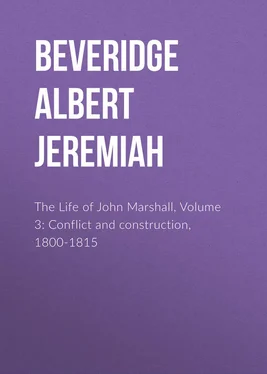See supra , chap. i.
Annals , 8th Cong. 2d Sess. 203-05; Chase Trial , 36-37.
Plumer, Feb. 11, 1805, "Diary," Plumer MSS. Lib. Cong.
Annals , 8th Cong. 2d Sess. 200; Chase Trial , 35.
See supra , chap. i.
Annals , 8th Cong. 2d Sess. 207. John Quincy Adams's description of all of the evidence is important and entertaining:
"Not only the casual expressions dropped in private conversations among friends and intimates, as well as strangers and adversaries, in the recess of a bed-chamber as well as at public taverns and in stage coaches, had been carefully and malignantly laid up and preserved for testimony on this prosecution; not only more witnesses examined to points of opinion , and called upon for discrimination to such a degree as to say whether the deportment of the Judge was imperative or imperious , but hours of interrogation and answer were consumed in evidence to looks , to bows , to tones of voice and modes of speech – to prove the insufferable grievance that Mr. Chase had more than once raised a laugh at the expense of Callender's counsel, and to ascertain the tremendous fact that he had accosted the Attorney General of Virginia by the appellation of Young Gentleman !!
"If by thumbscrews, the memory of a witness trace back for a period of five years the features of the Judge's face, it could be darkened with a frown, it was to be construed into rude and contumelious treatment of the Virginia bar; if it was found lightened with a smile, 'tyrants in all ages had been notorious for their pleasantry.'
"In short, sir, Gravity himself could not keep his countenance at the nauseating littlenesses which were resorted to for proof of atrocious criminality, and indignation melted into ridicule at the puerile perseverance with which nothings were accumulated, with the hope of making something by their multitude.
"All this, however, was received because Judge Chase would not suffer his counsel to object against it. He indulged his accusers with the utmost licence of investigation which they ever derived [ sic ], and contented himself with observing to the court that he expected to be judged upon the legal evidence in the case." (J. Q. Adams to his father, March 8, 1805, Writings, J. Q. A. : Ford, iii, 112-13.)
This was the fourth member of the Marshall family upon whom offices were bestowed while Marshall was Secretary of State. (See vol. ii, 560, of this work.)
Annals , 8th Cong. 2d Sess. 251-62; Chase Trial , 65-69. "I was unable to give credence to his [Heath's] testimony." (Plumer, Feb. 12, 1805, "Diary," Plumer MSS. Lib. Cong.) Although Heath's story was entirely false, it has, nevertheless, found a place in serious history.
Marshall's brother made an excellent impression on the Senate. "His answers were both prompt & lucid – There was a frankness, a fairness & I will add a firmness that did him much credit. His testimony was [on certain points] … a complete defense of the accused." ( Ib. Feb. 15, 1805.)
Harvie's son, Jacquelin B. Harvie, married Marshall's daughter Mary. (Paxton: Marshall Family , 100.)
Annals , 8th Cong. 2d Sess. 262-67; Chase Trial , 71.
Plumer, Feb. 16, 1805, "Diary," Plumer MSS. Lib. Cong.
Feb. 19, 1805, Memoirs, J. Q. A. : Adams, i, 354.
Chase did not leave Washington, and was in court when some of the arguments were made. (See Chase to Hopkinson, March 10, 1805; Hopkinson MSS. in possession of Edward P. Hopkinson, Phila.)
Feb. 13, 1805, Memoirs, J. Q. A. : Adams, i, 351.
Ib. The motion to admit the public was carried by one vote only. (Plumer, Feb. 13, 1805, "Diary," Plumer MSS. Lib. Cong.)
Feb. 13, 1805, Memoirs, J. Q. A. : Adams, i, 353.
Feb. 20, 1805, ib. 355.
Cutler, ii, 183; also Annals , 8th Cong. 2d Sess. 313-29; Chase Trial , 101-07.
Plumer, Feb. 20, 1805, "Diary," Plumer MSS. Lib. Cong.
Cutler, ii, 183.
Annals , 8th Cong. 2d Sess. 329-53; Chase Trial , 107 et seq.
Memoirs, J. Q. A. : Adams, i, 355-56.
Plumer, Feb. 21, 1805, "Diary," Plumer MSS. Lib. Cong.
Adams: U.S. ii, 231. Even Randolph praised him. ( Annals , 8th Cong. 2d Sess. 640.)
Annals , 8th Cong. 2d Sess. 354-94; Chase Trial , 116-49.
Feb. 21, 1805, Memoirs, J. Q. A. : Adams, i, 356.
"The effect on the auditory [was] prodigiously great." (Cutler, ii, 184.)
"His argument … was one of the most able … I ever heard." (Plumer, Feb. 21, 1805, "Diary," Plumer MSS. Lib. Cong.)
Feb. 22, 1805, Memoirs, J. Q. A. : Adams, i, 356.
Annals , 8th Cong. 2d Sess. 394-413; see also Chase Trial , 149-62; and Cutler, ii, 184.
Annals , 8th Cong. 2d Sess. 413-29; Chase Trial , 162-72.
Annals , 8th Cong. 2d Sess. 429-82; Chase Trial , 173 et seq.
Annals , 8th Cong. 2d Sess. 483.
Ib. 484-87.
See résumé of Franklin's indictment of the press in vol. i, 268-69, of this work.
Annals , 8th Cong. 2d Sess. 488; Chase Trial , *223.
"Mr. Martin really possesses much legal information & a great fund of good humour, keen satire & poignant wit … he certainly has talents." (Plumer, Feb. 23, 1805, "Diary," Plumer MSS. Lib. Cong.)
Annals , 8th Cong. 2d Sess. 489; Chase Trial , *224.












